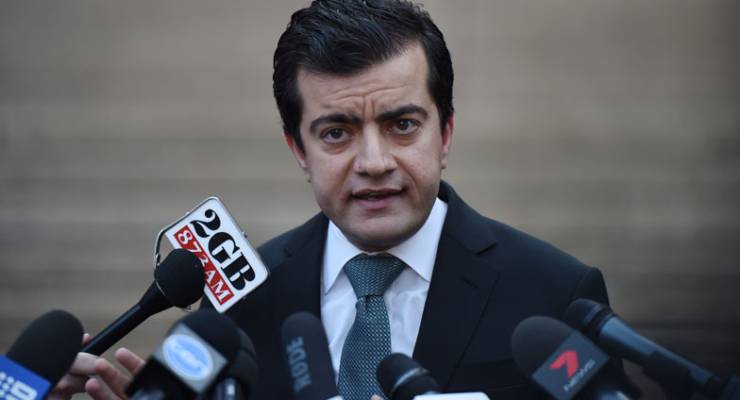
How to end travel rorts, donation scandals and other controversies over political funding? A new book of essays suggests a good start would be taking away Dracula’s keys to the blood bank.
“It’s one of those areas of law where you have the entities that will directly benefit from the legislation implementing and passing the legislation themselves,” author and University of Sydney academic Anika Gauja told Crikey.
“[Regulation] does happen on a very ad hoc basis. Either in response to a scandal of some sort, or if political parties by virtue of their position in government see an opportunity to legislate to either shore up their position by providing extra funding, or playing around with the electoral laws. That’s just the nature of party regulation,”
How parties should be regulated and funded in Australia is the subject of a new book of essays edited by Gauja and Australian National University emeritus professor Marian Sawer titled Party rules? Dilemmas of political party regulation in Australia. Released last month, the collection of essays explores the evolution of the regulation of parties, how they’re funded, and how to make permanent change rather than incremental reform after every scandal.
Regulation of Australia’s political parties is largely driven by two factors: either as a result of a scandal, or because the government sees a change it can make to benefit its own political party or dampen the electoral prospects of its rivals.
As there is increased focus on the role money plays in politics and how it benefits the two major parties, there have been some calls for a total ban on donations, restricting party money to public funds. Gauja says in a country where voting is compulsory, that system would make the incumbents less engaged with the electorate because they have to vote one way or another. It would also limit political expression.
“If you have full provision of funding, certainly the intent of that is to eliminate corruption, but I also think it doesn’t allow individuals to use donations as a form of expression, as a form of legitimate political expression. People don’t often have the time to get involved in political parties and often just donating $5, $10, or $100 is a way of engaging with the party and showing support.”
The compromise is to cap donations and spending across the board for political parties and in individual electorates, as well as increasing the amount paid per vote to parties. One essay the book, however, points out that based on the data available from NSW and Queensland elections where caps were in place, while it did level the playing field between the two major parties, there was still a significant funding gap between the two majors and minor parties, and an even bigger gap between established and new parties.
The only point where caps appeared to have the desired effect was in a locally run campaign. The Greens claimed the caps in the NSW state seat of Balmain allowed them to allocate funding to match Labor’s spending in that seat, as Labor would have otherwise flooded in funding to protect former member Verity Firth, who lost her seat to Jamie Parker in 2011.
“Political parties for any election in Australia don’t distribute their resources evenly. They target seats they can win, so having caps in particular seats as well as the aggregate can make contests a lot fairer on the ground,” Gauja said.
Another aspect that often goes unexamined is allowances for parliamentary representatives. Gauja says these rules too are made on an ad hoc basis, and are generally determined by the politics of the day. For example, crossbench parties tend to be given more resources such as staffing by the government when their vote is crucial to passing legislation.
“There’s also a lot of grey in terms of how they’re interpreted and how they are implemented. I think that leads to a degree of confusion on both the part of parliamentarians and the public. Having clearer guidelines would be of benefit to both parliamentarians and the public,” Gauja said.
The most consistent gripe minor parties have is a lack of resources. Greater resources allow major party MPs to be across all the issues, while minor parties with only one or a few members struggle to stay across every topic and piece of legislation.
But with those additional resources comes the inevitable complaints about politicians getting too much for what they do. Part of the issue is that the public has been left out of the process, Gauja says, and scandals about allowances would be less likely to pop up if there were input from people other than those who will benefit from the rules governing parliamentary benefits.
“If you pay attention to the process, you’re going to end up with a much more legitimate outcome if you involve people from the community in these decisions,” she said. “Leaving it entirely in the hands of the political parties leads to these patterns of behaviour where they legislate for the benefit of themselves.”
“I think the most important thing if we were starting again is to actually involve citizens and experts more in the process of designing these regulations rather than leaving it purely to the parties themselves.”








Crikey is committed to hosting lively discussions. Help us keep the conversation useful, interesting and welcoming. We aim to publish comments quickly in the interest of promoting robust conversation, but we’re a small team and we deploy filters to protect against legal risk. Occasionally your comment may be held up while we review, but we’re working as fast as we can to keep the conversation rolling.
The Crikey comment section is members-only content. Please subscribe to leave a comment.
The Crikey comment section is members-only content. Please login to leave a comment.